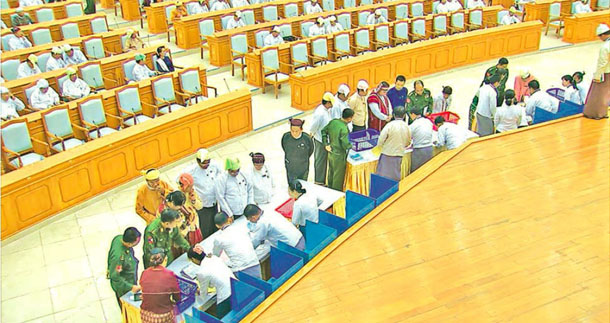RANGOON — A second raft of proposed constitutional amendments largely met the same fate as a first set of changes put to Parliament last month, with unelected military lawmakers again exercising their effective veto power on Wednesday to block efforts to reform the controversial charter.
Amendments to 21 articles of the Constitution failed to meet the 75 percent threshold required for enactment, while a series of additions to two sections of the charter passed muster and will ostensibly empower regional legislatures in the realms of lawmaking and taxation.
The amendments that failed to pass would have given Parliament enhanced prerogatives in helping shape the composition of Burma’s executive branch and judiciary, as well as elevate the status of parliamentary committees.
Several of the proposed changes would have weakened the power of the presidency, including one failed amendment that had been pushed by ethnic minority lawmakers in particular: allowing state and divisional legislatures to elect their own chief minister, rather than granting the president the power to appoint an individual to the post as is currently the case.
That provision, under Article 261, garnered 66 percent of votes in favor.
A total of 34 addendums to Schedule Two of the Constitution and 20 addendums to Schedule Five were approved by lawmakers, broadening the scope of matters on which regional legislatures can enact laws and levy taxes.
But Sandar Min, a member of the National League for Democracy (NLD) from Naypyidaw’s Zabuthiri constituency, said in order for regional parliaments’ enhanced role in governance to be realized, more substantive decentralization would need to take place in terms of political power, state budgeting and civil administration.
Sandar Min said that furthermore, even the amendments to Schedules Two and Five still left regional governments subject to constitutional provisions that ensure the Union government maintains preeminence.
The 34 additions to Schedule Two cover a variety of legislative domains including hotels and tourism, industrial zones and wildlife protection.
Schedule Five, enumerating regional governments’ taxation powers, was extended to allow those governments to bolster their state and divisional funds via taxes on 20 new potential revenue streams, including levies on income, commerce and customs.
Htay Yal, a Union Solidarity and Development Party (USDP) lawmaker, said he supported regional governments’ new taxation powers, calling them an “imperfect” but noteworthy initial effort to decentralize political power in Burma.
Responding to criticism of the Constitution’s enduring Union government primacy, Htay Yal said the hierarchy was appropriate “because regions and states are in a Union system.”
“It’s appropriate to discuss power, resource [sharing] and tax distribution related to regions and states in this Parliament, made up of all ethnicities,” he said.
A military representative, Brig-Gen Maung Maung, spoke in support of most of the 20 addendums to Schedule Five, but argued that some tax realms, such as in air transportation and oil and gas, should remain the prerogative of the Union government.
The power to tax oil and gas revenues could prove a major boon in particular for Burma’s coastal states and divisions, where there are estimates of large untapped offshore reserves.
Several other natural resources, however, were not included in the amended Schedule Five, including teak and other hardwoods, and mineral deposits.
Political commentator Yan Myo Thein said Wednesday’s rejection of Article 261 was the biggest blow for constitutional reform advocates.
“If regional and state parliaments cannot select their chief ministers, it’s impossible for states and regions to see their own government emerge in the post-2015 election [period]. In other words, there is no possibility for self-administration to emerge in ethnic regions. Without self-government and self-administration, the political path to a federal union is weakening.”
The provisions subject to Wednesday’s vote fell under Article 436(b) of the Constitution, which requires more than 75 percent of votes for amendments to all provisions of the charter not enumerated in Article 436(a). The military’s guaranteed allotment of 25 percent of seats in Parliament ensures that it holds an effective veto on constitutional reform.
On June 25, lawmakers failed to meet that threshold on five of six articles under Article 436(a), which specifies that a set of provisions must also be put to a national referendum if they first meet the 75 percent parliamentary threshold.
The vote last month included an effort by opposition parties and the ruling USDP to lower the threshold for Article 436 to 70 percent.
The June vote’s lone successfully amended article—a change of negligible practical significance—will require a national referendum, which Union Parliament Speaker Shwe Mann has said will be held concurrently with Burma’s general election on Nov. 8. That provision, Article 59(d), was changed from the current requirement that candidates for president and vice president be familiar with “military” affairs, to instead requiring that said candidates be well-versed in “defense” affairs.

















